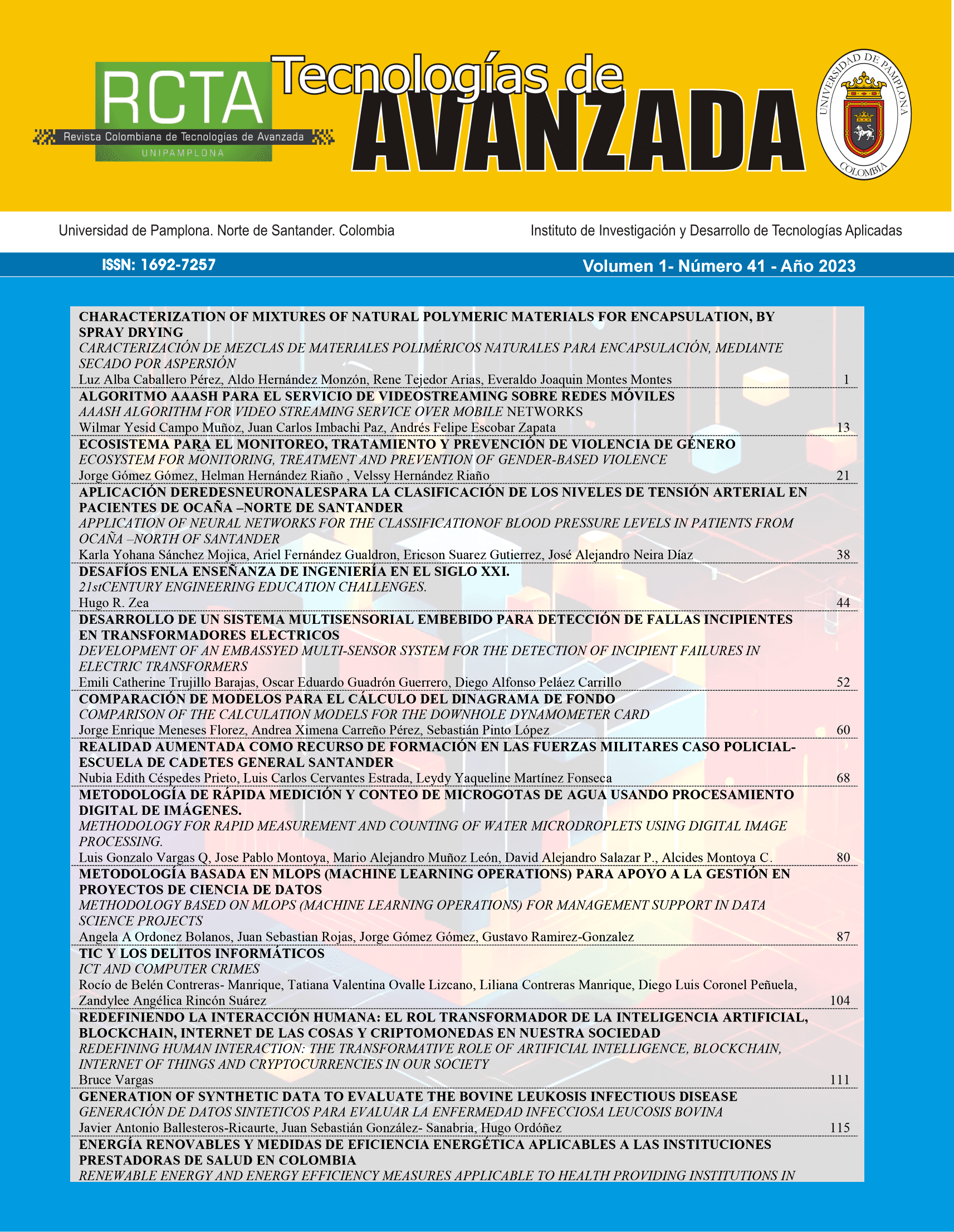Development of an embassyed multi-sensor system for the detection of incipient failures in electric transformers
DOI:
https://doi.org/10.24054/rcta.v1i41.2417Keywords:
Electronic Nose, Neural Network, PCA analysisAbstract
The project is based on the development of an embedded system capable of detecting incipient volatile gases in electrical transformers, in order to detect each of the gases that are located there, detailed engineering must be applied for the acquisition and acquisition of data from the multisensory system, this by means of each of the tests that must be applied to the sensors that were used for the sampling, after having done this type of engineering, an algorithm must be performed to classify the acquired data by means of the multisensory system previously proposed and this in order to know what type of gas was detected for the respective classification of them, once each of the previously formulated steps has been achieved, a wireless system capable of providing the information is going to be implemented internal that is presented in real time in the transformer in order to make a constant monitoring for prevent future damages, and with this, implement maintenance systems, whether preventive or predictive, and thus avoid costs to the company responsible for maintaining and maintaining these elements of electrical distribution.
Downloads
References
Brambila Tello, D., & Gijon Olivares, L. V. (2015). Predicción de fallas en los transformadores de potencia mediante la técnica de cromatografía de gases. https://tesis.ipn.mx/bitstream/handle/123456789/21906/Tesis%20completa-07-11-15.pdf?sequence=1&isAllowed=y
Carrillo Gómez, J. K., Duran Acevedo, C. M., & Garcia Rico, R. O. (2019). Discriminación de bacterias en agua potable a través de una nariz electrónica y un equipo de extracción de volátiles. (RCTA), 1(33), 155-165. https://doi.org/10.24054/rcta.v1i33.99 DOI: https://doi.org/10.24054/16927257.v33.n33.2019.3335
Correa, E. C., Barreiro y, P., & Ruiz-Altisent, M. (2005). Las narices electrónicas en el ámbito de la industria agroalimentaria. Alimentación, Equipos y Tecnología, 24(206), 90-98. https://oa.upm.es/5351/1/Barreiro_05.pdf
Custodio, M. A. (2019). Predicción por Redes Neuronales Artificiales del comportamiento productivo de Capra hircus "caprinos" en crianza semiextensiva. https://dspace.unitru.edu.pe/server/api/core/bitstreams/256198f4-70c7-4b33-bf6e-bddb87b5a517/content
Durán Acevedo, C. M., Jaimes Mogollón, A. L., & Gualdron Guerrero, O. E. (2016). Aplicación de una lengua electrónica para la clasificación de vinos. (RCTA), 2(28). https://www.unipamplona.edu.co/unipamplona/portalIG/home_40/recursos/05_v25_30/revista_28/20052017/03.pdf
García Vélez, E. O., & Gaspar España, C. O. (2010). Diagnóstico y mantenimiento de transformadores de gran potencia en aceite (aplicado a un transformador de 160MVA, 13,8kv/138kv de la Central Térmica Trinitaria) https://dspace.ups.edu.ec/handle/123456789/2109
Gualdrón Guerrero, O. E., Durán Acevedo, C. M., Araque Gallardo, J. A., & Ortíz Sandoval, J. E. (2014). Implementación de un modelo neuronal en un dispositivo hardware (FPGA) para la clasificación de compuestos químicos en un sistema multisensorial (nariz electrónica). (RCTA), 2(24), 127-133. https://doi.org/10.24054/rcta.v2i24.1224
Gutiérrez Chávez, B. A., & Montes de Oca-Ramírez, G. (2021). Determination of faults severity in power transformers immersed in mineral insulated oil based exclusively on the DGA and by evaluating the NEI. (Rev. Ci. Tec.), 4(3), 208-223. https://doi.org/10.37636/recit.v43208223 DOI: https://doi.org/10.37636/recit.v43208223
Jaimes Vergel, H. D. (2019). Desarrollo de un sistema para detectar pesticidas en datos cromatográficos de papa y piña usando procesamiento digital de señales. http://repositoriodspace.unipamplona.edu.co/jspui/bitstream/20.500.12744/3340/1/Jaimes_2019_TG.pdf
Marín Díaz Araque, J. M. (s.f.). Tema 3: Análisis de Componentes Principales. https://halweb.uc3m.es/esp/personal/personas/jmmarin/esp/amult/tema3am.pdf
Matich, D. J. (2001). "Redes Neuronales: Conceptos Básicos y Aplicaciones." https://www.frro.utn.edu.ar/repositorio/catedras/quimica/5_anio/orientadora1/monograias/matich-redesneuronales.pdf
Paredes-Doig, A. L., Sun Kou, M. R., Picasso-Escobar, G., Doig-Camino, E., & Comina, G. (2016). Implementation y evaluación de una nariz electrónica para la detección de alcoholes lineales. Revista Colombiana de Química, 45(2), 12-18. https://doi.org/10.15446/rev.colomb.quim.v45n2.60393 DOI: https://doi.org/10.15446/rev.colomb.quim.v45n2.60393
Prieto Castañeda, N. (2012). Implementación de un sistema de evaluación sensorial electrónico para el control de calidad de vinos. http://uvadoc.uva.es/handle/10324/1900
Rodríguez Díaz, J., Contreras de León, J. E., & Zambrano, E. (2020). ¿Conoces los análisis de gases para la prevención oportuna de fallas en los transformadores? http://prolecge.com/wp-content/uploads/2020/02/conoces-los-ana%CC%81lisis-de-gases-para-la-prevencio%CC%81n-oportunda-de-fallas-en-transformadores.pdf
"TANCO, F.; (2003) Introducción a las Redes Neuronales Artificiales, Grupo de Inteligencia Artificial (GIA), UTN-FRBA, Argentina. https://www.frba.utn.edu.ar/wp-content/uploads/2021/02/RNA.pdf"
UPV-EHU. (2008). Redes Neuronales Artificiales y sus Aplicaciones [Curso online]. Profesor: Xabier Basogain Olabe. Dpto. Ingeniería de Sistemas y Automática, Escuela Superior de Ingeniería de Bilbao, UPV-EHU. https://ocw.ehu.eus/pluginfile.php/40137/mod_resource/content/1/redes_neuro/Course_listing.html
Published
How to Cite
Issue
Section
License
Copyright (c) 2023 REVISTA COLOMBIANA DE TECNOLOGÍAS DE AVANZADA

This work is licensed under a Creative Commons Attribution-NonCommercial 4.0 International License.














